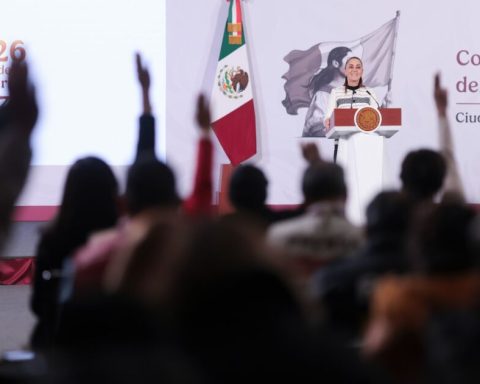Hundreds of eyes examine Bishop Izani Bruch (51) as she travels on the Santiago Metro. They whisper about her as she walks by, they greet her half incredulously, they say things like: “Look, a Band-Aid”. She, dressed in a clerical shirt and the great bishop’s cross bearing Luther’s rose, does not go unnoticed. And although she is bothered by so much attention and sometimes she sticks her neck out to walk “anonymous” in public locomotion, she says that she chooses to use it to make the ministry of women visible.
The eyes also follow her inside La Moneda, when we go through the nooks and crannies that separate her office, in the basement, to the chapel on the first floor, where we sit down to talk. It is vaccination day at the Palace, so there is more movement, many people and lines of officials.
It is Wednesday, which until recently was her day off, but since the Government of President Gabriel Boric named her chaplain of La Moneda, it has become the day of the chaplaincy.
“I received a call from the person in charge of ecclesiastical affairs informing me of the decision and telling me that they were waiting for me at lunch the next day. I did not know what to say. He just found me in a meeting of the Synodal Council. They were all very happy, the same in my house. That night, when I went to bed, I thought: what did I get myself into, “he recounts.
“It’s still nice to be able to accompany and be part of this dream and the construction of that Chile that we want… Which is difficult, but which we want,” he says, reaffirming his head.
Your charge is ad honorem and shares roles with the priest Nicolás Vial and the rabbi Eduardo Waingortin.
-President Boric is agnostic, have you had occasion to talk with him?
I haven’t had any conversations yet. But I have met him in other spaces and it has seemed to me that he is very respectful and understands how important spirituality is in people’s lives.
-Eventually I could ask you for some advice…
-It is possible, but you can also do it with the other representatives of the churches. I think that the chaplains and the rabbi can do things together. Today there is openness and our theologies have meeting points.
-There was a controversy in his appointment. Voices of the National Evangelical Platform that even raised the alternation in the chaplaincy.
-There are about 5 thousand registered churches, the Lutheran is a way of living the gospel and the chaplaincy is not a representative of the evangelical world, it is a pastoral task. And it is the government’s choice. I hope to have an open, close work that listens to those who need it, including those who think differently from me. We can, in our diversity, look for what unites us. My role is not political, it is pastoral.
the ring of tucum
Izani Bruch speaks softly, but with accurate, firm words, nuanced with a Portuguese accent and tone. His sky-green eyes look frankly. Between his fingers stands out a black ring (made with tucum, the palm seed from the Amazon) like the one used by Pedro Casaldáliga, a Catholic bishop, writer and missionary, linked to Liberation Theology. Today the Tucum ring represents the option for the poor of Latin America. “I have one to deliver to the President. It is a beautiful symbol because, no matter where we are from, we can find each other and by having the ring we know that we have that commitment for the most dispossessed, ”he points out.
Bruch has a degree in Theology, a master’s degree from the Faculty of Theology of Sao Leopoldo, Brazil, and was ordained to the pastoral ministry in 2002. For 10 years she exercised that function in the La Paz Congregation of Osorno, and since 2013 she is the pastor of the Congregation of the Good Samaritan in the town of La Faena, Peñalolén. In 2019 she was appointed bishop.
He was born in Vila Aparecidinha do Este, near Foz de Iguazú (today renamed Itaupulandia), to a Lutheran family of German descent. There he lived until he was 18 years old. A quiet childhood, with 5 brothers -2 women (one adoptive) and three men-. “A very careful, free, happy childhood. I never lacked, but I didn’t have too much either, ”she recalls.
In the middle of a retreat, while she was a catechism monitor, talking with the pastor, she found out about the existence of the feminine ministry. She applied to study Theology. She stayed and gave up her fledgling teaching career. She left for Rio Grande in Porto Alegre and never returned to live in her hometown. “The world opened up to me, I found myself with poverty, prostitution, discrimination. Everything I did not see in my childhood. I began to understand the world of women and how violent it was and is, ”she recalls.
On an exchange trip to Chile, she met her first husband. A young Mapuche very involved with the cause of his town. “I formed a family, I had my oldest son (today 29 years old) and I stayed. I interrupted my studies for a while and then I ended up in Chile. I was doing community and family life here. I have lived longer in this country than anywhere else.”
Over the years his first marriage ended.
“Pastors are people, human and we go through all the difficulties that everyone goes through. We suffer family crises, our children also have problems. In my case, a life project that was thought and dreamed of together, broke and that is why I like my church so much, because it said: let’s see… it broke, then you can get a divorce and rebuild your life”.
She met her second husband thanks to an interview they did when she was a shepherd in Osorno.
“I was in the process of thinking, of seeing how I would continue after the breakdown of my life project. Marcelo was also in crisis and, upon reading the interview, he asked me to make an appointment to ask for pastoral advice. He traveled from Puerto Montt where he lived. We met and… I always say: love is love. I was legally divorced, we started a relationship and we lived as a family for 15 years with our daughter (12 years old), “he says.
When the Church moved her to Santiago, he left his job, his things in the region, and left. “It was difficult, the first three years nothing came of it in Santiago, but we were there. Life also involves sacrifices”, he emphasizes.
patriarchal church
The bishop begins the day, like many Chilean women, at 6 in the morning to prepare the lunch that her daughter will take to school. She clarifies that she first prepares the mate (her husband is Uruguayan) and from there comes a run-run time, where she rushes the pre-adolescent to meet the schedules.
Then he does the housework that he has to do. And he dedicates the morning to the bishopric: meetings, mail, prayers. In the afternoon he concentrates on work in his community of La Faena, in Peñalolén.
He points out that, although the Lutheran Church has taken a structural step, by allowing men and women to assume the same positions, “however, it does not mean that it is not a patriarchal or sexist Church.”
In fact, the Lutheran World Federation, since 2013, made a gender justice policy to break down barriers that still exist. “You see it in very practical things. For example, when there is a shepherdess, no one cares if she is going to be clean, tidy, because it is automatically considered that the shepherdess will do that. When there is a pastor, they are all concerned that the tablecloth must be washed, the temple must be kept clean, the tasks are distributed. I also feel that we are allowed to make fewer mistakes. We have to take great care of ourselves. We are always validating ourselves to show that we are capable.”
– Do men let themselves be shepherded by a woman?
-Some. There one sees the difference. The men in the community have gone through a learning process. At first they are distant, they look strange, but in the process they validate you. Today I feel that my community cares for me. There is no lack of someone extremely macho who thinks that I shouldn’t be in the place I am, but they are those who believe the same about all women.
– Do you declare yourself a feminist bishop?
-I always say ‘I couldn’t be a Christian and not a feminist’. We are so full of prejudice. When reading the Gospel, the first one who speaks of a fight for gender justice is Jesus. He dignifies women, he talks to them about theology. They are the ones who find the tomb empty, they are the ones sent to proclaim the good news. The Gospel is feminist in the sense that it seeks justice for men and women in all areas of life, so it could not not be feminist. In a society that denies you rights, it is an opportunity to be in the place where I am being a feminist, but always very connected to the Gospel itself.
-He also spoke in favor of legislating on abortion.
-With my Church we are in favor of the decriminalization of abortion. That is, the law of the three causes was necessary. That does not mean that one is in favor of abortion; I am in favor of women deciding about their bodies. We understand that abortion is a situation that happens in the lives of women and, therefore, there must be a law that responds to it.
-Is this Chile very different from the one that received it 30 years ago?
-When I arrived it was so different from my culture… And today there is diversity, it is a country that has opened up in every way. He was very macho (mine too, but here he felt very strong in everyday life). I like the Chile of the new generations, I loved seeing the feminist movement, those who demand equity, gender justice, also that spirituality is expanding: it is no longer a country where only the voice of the Catholic Church is heard. I love that diverse Chile.
Does that include sexual diversity?
I’ve grown up with it. I thank God that he has given me people of sexual diversity because, when we don’t know, the unknown causes us fear. 25 years ago I did not think like today. I thank my Church that speaks of all people being the image and likeness of God, so if I meet a person of sexual dissidence, I face the face of God. The same with a Mapuche, with the black woman. We are all sons and daughters of God and have the same dignity. Our salvation does not pass through how we live our sexuality, it does not pass through our merits or works, it passes through our faith.
-You were close to the Mapuche world through your ex-husband, how do you see today that place where some violent act occurs every day?
-As a society we owe a debt to all native peoples, also in Brazil. We have trampled on their culture, their spirituality and we all have to work on that. One also sees the poverty in which the Mapuche communities live. There the State, society, we must make an effort for reparation, because we all have the same dignity. That dignity, both in Chile and in other Latin American countries, has been denied them. Now, the worrying thing is the violence that we see and there we need more tools to analyze and speak. What I lived, from the experience I have with the Mapuche world, for having shared an important time of my life with them, I can say that the Mapuche family is not violent, it is not what happens on TV. I understand that there are other problems within the South Macrozone that are causing so much violence. I hope that all sectors of society can work on this violence. I insist, I don’t think it comes from the Mapuche world.
-Why do you think everything points to them?
-There are stigmatizations. That is a task as a society and especially of the Church: to work, claim that dignity of those who are stigmatized within society. The Mapuche are a ‘marked’ group among Chileans, as well as the sexual dissidents and now also the migrants… Well, except for the white, European migrant.
-You are a migrant…
-But because of my last name and skin color I have not been stigmatized. If I were a black Brazilian, perhaps my relationship with Chile would be different.
He adds that the great task is precisely to combat discrimination. “In any order, among the women themselves: it is not the same to speak of a white woman from the city as of an indigenous woman, of a peasant. You have to be able to diversify the views to, precisely, talk about gender justice.

Minister Giorgio Jackson and chaplain of La Moneda.
















